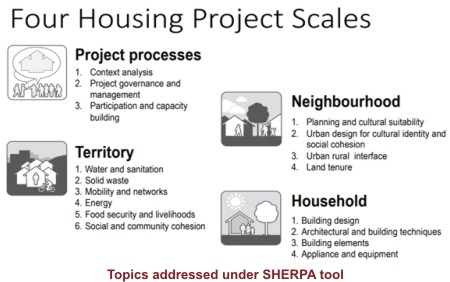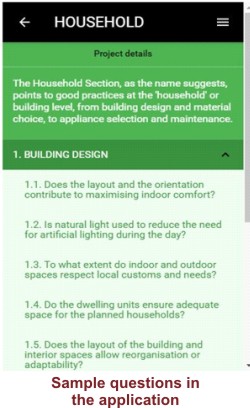|
Assessment Tools to
Measure Sustainability
World
over communities are now conscious
The introduction of the Assessment Tool EDGE
in the worldwide market of rating tools shows that there is a real need
for bottom up simplified tools. EDGE is an easy to use rating tool which
focuses mainly on three aspects of sustainable buildings: energy, water
and materials. Despite the efforts of EDGE to be adapted to developing
countries, there is still a huge gap with the reality and needs of the
African continent. Africa will have the largest growth of population in
cities in the coming decades and they are asking that external rating
tools should not be imposed on them as guidelines for their development.
They have a need for reinforcing their own models focusing on culture as
a design value and community management as the fundamental basis for
sustainable development. The SHERPA Assessment Tool was developed initially for the African countries. Supported by the One Planet Network, this tool was developed by a team of housing and sustainability experts from UN-Habitat, CRAterre-ENSAG, VTT Technical Research Centre of Finland and the University of Cambridge, in collaboration with the Kenya Slum Upgrading Programme (KENSUP), Yaam Soldarité and Architecture sans Frontiérs Nepal. SHERPA is an easy to use self-evaluation tool for project managers, communities and other stakeholders involved in the planning, design, construction and assessment of housing projects. SHERPA assesses housing projects from the initial inception of projects through the site selection and design process all the way up to the end of life cycle and recyclability of building materials used. SHERPA’s holistic approach allows for the assessment of sustainability in terms of environmental, cultural, economic and social sustainability, allowing for a holistic assessment of the impact and sustainability of housing projects. The Rating Tool consists of a step-by-step questionnaire including indicators that measure the sustainability of the project. The data required to answer the questionnaire is mainly qualitative and easy to use for field staff or project managers of the building sector. The questionnaire measures how sustainable the project is, by scoring each pillar of sustainable development, encompassing 12 sustainability criteria. Sustainability corresponds with an overall balance of all four pillars, by scoring at least a minimum threshold value, defined by a minimum acceptable level for each addressed issue.
In Nepal, SHERPA has been a useful tool for
reconstruction of earthquake affected houses. The SHERPA tool has helped
to re-build people’s lives through a participatory and owner-driven
approach. It has been effective in planning and design of social housing
projects keeping in mind the sustainability aspects.
Pratibha Caleb
|
 of the impact that their lifestyles
are having on the environment and thereby their future generations.
Various assessment tools are available to assist designers, developers
and regulatory bodies to reduce the negative impacts of environmental,
social, economic and cultural constraints. These tools vary considerably
in what and how they measure and how the measurement results are
presented and interpreted.
of the impact that their lifestyles
are having on the environment and thereby their future generations.
Various assessment tools are available to assist designers, developers
and regulatory bodies to reduce the negative impacts of environmental,
social, economic and cultural constraints. These tools vary considerably
in what and how they measure and how the measurement results are
presented and interpreted. 